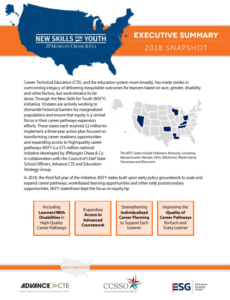 The Met, a work-based learning focused technical center in Providence, Rhode Island, serves about 800 students across the state. It is also one of eight recipients of Rhode Island’s new Innovation and Equity grant program, a $1.2 million program to help local districts identify and support populations that are underrepresented in high-skill, in-demand career pathways. Using funding from the Innovation and Equity grant program, the Met is working to recruit low-income learners into the Finance program and help them earn high-value credentials that have immediate value in the labor market.
The Met, a work-based learning focused technical center in Providence, Rhode Island, serves about 800 students across the state. It is also one of eight recipients of Rhode Island’s new Innovation and Equity grant program, a $1.2 million program to help local districts identify and support populations that are underrepresented in high-skill, in-demand career pathways. Using funding from the Innovation and Equity grant program, the Met is working to recruit low-income learners into the Finance program and help them earn high-value credentials that have immediate value in the labor market.
Access and equity is a priority for Rhode Island and its nine peer states in the New Skills for Youth initiative, a focus that is highlighted in a new series of state snapshots released today. In 2017, each New Skills for Youth state was awarded $2 million to help transform career readiness opportunities for learners in their states. After spending the early part of the initiative establishing partnerships and laying the policy groundwork for success, states turned to implementation, with a focus on equity, in 2018.
Some states are focusing on including learners with disabilities in high-quality career pathways. For example, Delaware piloted a new program in 2018 called PIPELine to Career Success to remove barriers for learners with disabilities to access work-based learning experiences. The program is a two-year process in which school districts identify barriers to access, examine their root causes, and then implement strategies to close access gaps. The Delaware Department of Education has made grants available to three pilot districts and hopes to scale the approach across the state in the future.
Other states are working to expand access to advanced coursework for underserved populations. Rhode Island Innovation and Equity program is one such initiative. Another is Ohio’s Expanding Opportunities for Each Child grant. The state leveraged a rarely used allowance in the Every Student Succeeds Act, which lets states set aside up to 3 percent of their Title I funds for Direct Student Services grants, to award more than $7 million to 17 sites in economically disadvantaged communities. The grants are designed to either develop and expand career pathways or improve access to advanced coursework (including AP, IB and CTE).
Additionally, New Skills for Youth states are embedding equity as a core principle in both policy and practice. Several states are implementing statewide initiatives in support of academic and career planning, and they have focused their training, guidance and supports to emphasize the importance of equity. Others have built considerations about equity into their criteria for designating – and funding – high-quality career pathways. These steps ensure that questions of equity and access are addressed at every stage, from design to implementation.
The 2019 calendar year is the final year of this stage of the New Skills for Youth initiative. As states look beyond the end of the initiative, one question that is front and center in the year ahead is how they will secure commitment and funding to keep the focus on career readiness. States have made a lot of progress, and the efforts they have taken to embed equity in policy and practice will have a lasting impact for years to come. But state leaders understand they must continue to elevate this work as a priority to ensure their efforts in New Skills for Youth can be sustained and scaled in the future.
The state snapshots were developed through the New Skills for Youth initiative, a partnership of the Council of Chief State School Officers, Advance CTE and the Education Strategy Group, generously funded by JPMorgan Chase & Co.
Austin Estes, Senior Policy Associate
Tags: Delaware, Equity, New Skills for Youth, NSFY, Ohio, rhode island

